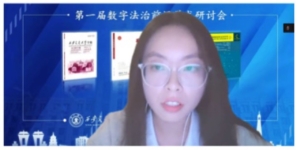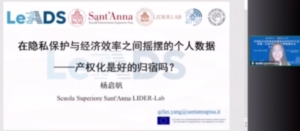ESR Qifan Yang participation at Symposium on Frontier of Smart Nomocracy & China Economic Law Annual Conference

Early-Stage Researcher Qifan Yang (ESR 1) presented her work about personal data value and protection systems in the Symposium on Frontier of Smart Nomocracy jointly sponsored and hosted by the Journal of Xi’an Jiaotong University (Social Science), Journal of the East China University of Politics & Law, SJTU Law Review, and Journal of Cyber and Information Law in Xi’an (China) on the 12th-13th of November.
As a part of the panel “Data Property Rights and Data Trading System”, she analyzed the value distributions of personal information among different subjects and across various transaction parties in the data collection, processing, and analysis process from the perspectives of communication and information economics.
 Unlike ordinary trading objects, data has both basic use value “information collection” (eliminating the information asymmetry between the parties in the transaction) and potential use value “data analysis and prediction”. Personal data have little use value for information producers but have exchange value for other parties in the transaction to achieve information symmetry or expand the advantages of information asymmetry. Other available data in the market have basic use value for individual users to obtain information, but it is difficult to generate exchange value through individual collection or analysis because of its openness and accessibility. The company or platform can realize both the basic value and the potential value through data aggregation, data fusion, etc.
Unlike ordinary trading objects, data has both basic use value “information collection” (eliminating the information asymmetry between the parties in the transaction) and potential use value “data analysis and prediction”. Personal data have little use value for information producers but have exchange value for other parties in the transaction to achieve information symmetry or expand the advantages of information asymmetry. Other available data in the market have basic use value for individual users to obtain information, but it is difficult to generate exchange value through individual collection or analysis because of its openness and accessibility. The company or platform can realize both the basic value and the potential value through data aggregation, data fusion, etc.
On the 3rd-4th of December, ESR1 Qifan Yang’s research “Personal Data Wavering between Privacy and Efficiency: Is Propertization a Good Answer?” won the third prize at the China Economic Law Annual Conference organized by China Economic Law Society in Wuhan (China). It illustrated the causes for de facto property rights in personal data, the attribution of de facto property rights in the free market, and its endogenous flaws through the Coase theorem and property theory based on law and economics.





